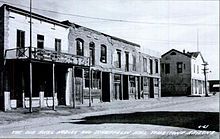Portal:North America
The North America Portal

North America is a continent in the Northern and Western Hemispheres. North America is bordered to the north by the Arctic Ocean, to the east by the Atlantic Ocean, to the southeast by South America and the Caribbean Sea, and to the west and south by the Pacific Ocean. The region includes the Bahamas, Bermuda, Canada, the Caribbean, Central America, Clipperton Island, Greenland, Mexico, Saint Pierre and Miquelon, the Turks and Caicos Islands, and the United States.
North America covers an area of about 24,709,000 square kilometres (9,540,000 square miles), representing approximately 16.5% of the Earth's land area and 4.8% of its total surface area. It is the third-largest continent by size after Asia and Africa, and the fourth-largest continent by population after Asia, Africa, and Europe. As of 2021[update], North America's population was estimated as over 592 million people in 23 independent states, or about 7.5% of the world's population. In human geography, the terms "North America" and "North American" can refer to Canada, the United States, Mexico, and Greenland or, alternatively, Canada, Greenland and the US (Mexico being classified as part of Latin America) or simply Canada and the US (Greenland being classified as either Arctic or European (due to its political status as a part of Denmark) and Mexico classified as Latin American).
It is unknown with certainty how and when first human populations first reached North America. People were known to live in the Americas at least 20,000 years ago, but various evidence points to possibly earlier dates. The Paleo-Indian period in North America followed the Last Glacial Period, and lasted until about 10,000 years ago when the Archaic period began. The classic stage followed the Archaic period, and lasted from approximately the 6th to 13th centuries. Beginning in 1000 AD, the Norse were the first Europeans to begin exploring and ultimately colonizing areas of North America.
In 1492, the exploratory voyages of Christopher Columbus led to a transatlantic exchange, including migrations of European settlers during the Age of Discovery and the early modern period. Present-day cultural and ethnic patterns reflect interactions between European colonists, indigenous peoples, enslaved Africans, immigrants from Europe, Asia, and descendants of these respective groups. (Full article...)
The Convention of 1832 was the first political gathering of colonists in Mexican Texas. Delegates sought reforms from the Mexican government and hoped to quell the widespread belief that settlers in Texas wished to secede from Mexico. The convention was the first in a series of unsuccessful attempts at political negotiation that eventually led to the Texas Revolution.
Under the 1824 Constitution of Mexico, Texas was denied independent statehood and merged into the new state Coahuila y Tejas. After growing suspicion that the United States government would attempt to seize Texas by force, in 1830 Mexican President Anastasio Bustamante enacted the Law of April 6, 1830 which restricted immigration and called for customs duty enforcement. Tensions erupted in June 1832, when Texas residents systematically expelled all Mexican troops from eastern Texas. (Full article...)

Raymond Robert Emery (né Nichols; September 28, 1982 – July 15, 2018) was a Canadian professional ice hockey goaltender who played in the National Hockey League (NHL) for eleven seasons, between 2003 and 2015. Emery was chosen 99th overall by the Ottawa Senators in the 2001 NHL Entry Draft. During the 2006–07 season, he gained the starting job and backstopped his team to the Stanley Cup Finals, the first appearance in the finals for the modern Senators' franchise. However in the subsequent season, he lost his place as the team's starting goaltender due to an injury. He won a Stanley Cup championship with the Chicago Blackhawks in 2013.
In 2013, Emery won the William M. Jennings Trophy along with teammate Corey Crawford, awarded to the goaltender or goaltenders who give up the fewest goals in the season. Emery was a two-time Bill Masterton Memorial Trophy finalist for his dedication and perseverance. His teammates and fans often referred to him as "Razor" or "Sugar Ray" for his aggressive playing style. (Full article...)
The O.K. Corral hearing and aftermath was the direct result of the 30-second Gunfight at the O.K. Corral in Tombstone, Arizona Territory, on October 26, 1881. During that confrontation, Deputy U.S. Marshal and Tombstone Town Marshal Virgil Earp, Assistant Town Marshal Morgan Earp, and temporary deputy marshals Wyatt Earp and Doc Holliday shot and killed Billy Clanton, and Tom and Frank McLaury. Billy's brother Ike, who had repeatedly threatened to kill the Earps for some time, had been present at the gunfight but was unarmed and fled. As permitted by territory law, he filed murder charges against the Earps and Doc Holliday on October 30.
In an unusual preliminary hearing, Justice of the Peace Wells Spicer heard testimony from a large number of witnesses during the next 30 days. Friends of the Cowboys, most notably Cochise County Sheriff Johnny Behan, testified that the Cowboys had thrown up their hands or opened their coats and been shot in cold blood. Initially persuasive, his testimony motivated Spicer to jail Wyatt Earp and Doc Holliday who had been free on bond. (Virgil and Morgan were recuperating from their wounds.) Friends of the lawman and several key neutral witnesses then testified that the Cowboys had drawn their guns and that Virgil Earp had called out, "Hold, I don't want that!" or words to that effect. In a lengthy ruling, Spicer concluded there was no basis for a trial. Although he criticized Virgil Earp's use of Wyatt and Holliday as deputies, he concluded that no laws were broken by the lawmen. He said the evidence indicated that the Earps and Holliday acted within the law and that Holliday and Wyatt had been properly deputized by Virgil. He described Frank McLaury's insistence that he would not give up his weapons unless the marshal and his deputies also gave up their arms as a "proposition both monstrous and startling!" (Full article...)
Did you know...
- ...that the proposed Atlantica trade bloc would economically tie New England in the U.S. to the Atlantic Provinces of Canada?
- ...that a circumferentor (pictured) was an important tool to surveyors for mapping the North American frontier?
- ...that the Soufrière Hills volcano is an active complex stratovolcano with many lava domes forming its summit on the Caribbean island of Montserrat?
- ... that the First Mexican Empire was the official name of independent Mexico under a monarchical regime from 1822 to 1823?
- ...that the Land Run of 1889 resulted in the founding of both Oklahoma City and Guthrie, whose populations grew from zero to over 10,000 in less than a day?
Selected panorama

Topics
Categories
List articles
Related portals
Northern America
Central America
Caribbean
WikiProjects
 North America
North America-
 Canada
Canada -
 Greenland
Greenland -
 Mexico
Mexico -
 Saint Pierre and Miquelon
Saint Pierre and Miquelon -
 United States
United States  Central America
Central America-
 Belize
Belize -
 Costa Rica
Costa Rica -
 El Salvador
El Salvador -
 Guatemala
Guatemala -
 Honduras
Honduras -
 Nicaragua
Nicaragua -
 Panama
Panama  Mesoamerica
Mesoamerica Caribbean
Caribbean-
 Antigua and Barbuda
Antigua and Barbuda -
 Bahamas
Bahamas -
 Barbados
Barbados -
 Bermuda
Bermuda -
 Cuba
Cuba -
 Dominica
Dominica -
 Dominican Republic
Dominican Republic -
 Grenada
Grenada -
 Haiti
Haiti -
 Jamaica
Jamaica -
 Puerto Rico
Puerto Rico -
 Saint Kitts and Nevis
Saint Kitts and Nevis -
 Saint Lucia
Saint Lucia -
 Saint Vincent and the Grenadines
Saint Vincent and the Grenadines -
 Trinidad and Tobago
Trinidad and Tobago
Associated Wikimedia
The following Wikimedia Foundation sister projects provide more on this subject:
-
Commons
Free media repository -
Wikibooks
Free textbooks and manuals -
Wikidata
Free knowledge base -
Wikinews
Free-content news -
Wikiquote
Collection of quotations -
Wikisource
Free-content library -
Wikiversity
Free learning tools -
Wikivoyage
Free travel guide -
Wiktionary
Dictionary and thesaurus



























